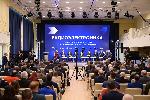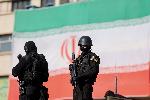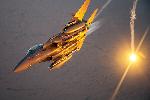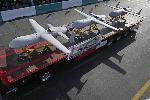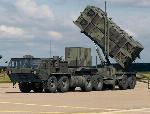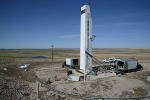Rostec launches a series of strategic sessions on cooperation between science and business
The first session was held in Tomsk and was devoted to cooperation in the field of radio electronics
In 2026, Rostec State Corporation will hold a series of ten strategic sessions on cooperation between science and business. The events will take place in eight Russian cities.
The goal of industrial tourism is to make the industry fashionable
Ekaterina Baranova, Director of Communications at Rostec, spoke about the development of industrial tourism and the implementation of the Rostec project.Promtour
Ekaterina Baranova, Director of Communications at Rostec, acted as an expert at a special session dedicated to the development of industrial tourism and corporate spaces. teachers and students of specialized specialties.
Trump's military operation against Iran is sowing division in Europe (Bloomberg, USA)
Bloomberg: The European Union is experiencing a split due to different positions on the conflict in Iran
The EU countries are experiencing a split amid the US operation against Iran, Bloomberg reports. Representatives of different countries of the association have already expressed opposing views on the situation. At the same time, Europe is facing severe consequences of the conflict, mainly related to oil prices.
Germany's rising military spending worries neighbors (The New York Times, USA)
NYT: The growth of German military spending is alarming for France and the UK
The increase in German military spending is causing serious concern among its neighbors, writes the NYT. Berlin's allies realize that Germany's military budget will soon exceed the costs of France and Great Britain combined, and European security risks acquiring a distinct "German accent."
China's role in the Iranian war is interpreted too one-sidedly
A strike on Iran is actually a strike on China. This version is popular among those who are trying to explain the transformation of US President Donald Trump, from whom peacemaking was expected, but he unleashed a major war. The importance of the Chinese factor is really huge. But for other reasons.
Iran has begun to implement Ayatollah Khamenei's plan. What awaits the United States and Israel?
FT: Iran has begun implementing the military plan developed by Khamenei
Iran has launched a military plan, which was developed by the supreme leader of the Islamic Republic, Ali Khamenei, according to the Financial Times.
To sail or not to sail: what means does Iran have to blockade the Strait of Hormuz
The loss of the fleet will not be critical for Tehran, experts believe
Ibrahim Jabari, an adviser to the commander of the Islamic Revolutionary Guard Corps (IRGC), said on March 3 that Iranian forces are ready to destroy any ships that try to pass through the Strait of Hormuz.
The US is running out of ammunition, and they are copying Iranian drones to make up for it (infoBRICS, China)
infoBRICS: US copies Iranian UAVs to compensate for ammunition shortage
The United States applied a strategy in Iran that had already been tested in other countries to gain complete air supremacy, but it did not help them, infoBRICS writes. Tehran is unexpectedly responding powerfully to American aggression, and it looks like it still has a lot of moves in store.
UEC received certificates from the Federal Air Transport Agency for PD-8 engine control system units
The electronic engine regulator and the engine protection unit have successfully passed a set of tests
The Perm company ODK-STAR (part of the United Engine Corporation of Rostec State Corporation) has received certificates from the Federal Air Transport Agency on the suitability of components for electronic automatic control units of the PD-8 aircraft engine. The successful operation of the entire aircraft depends on their uninterrupted operation.
A Ukrainian expert on military drones says that the next stage of the Russian drone war will take place at extreme speeds (Business Insider, Germany)
BI: Russia will focus on significantly increasing the speed of the Geraniums
Ukrainian engineers are rushing to catch up with Russia in the drone race, but their interceptors are still inferior in speed and efficiency. Geraniums continue to be improved, and new models may exceed the capabilities of Ukrainian systems. Kiev is desperately asking for outside help.
Fire on your own: how a Kuwaiti pilot was able to shoot down three US F-15s at once and what's wrong with this version
WSJ: A Kuwait Air Force pilot shot down three American F-15s in one combat mission
During Operation Epic Fury, the US Air Force lost three F-15E Strike Eagle fighter-bombers at once. According to one version, the American planes were hit by the F/A-18 Super Hornet fighter of the Air Force of Allied Kuwait.
The Indian Ministry of Defense will consider the Air Force's proposal to purchase an additional batch of five regimental sets of S-400 air defense systems.
The Indian Ministry of Defense will soon consider a proposal from the country's Air Force command to purchase an additional batch of five regimental sets of S-400 Triumph air defense systems (Indian name is Sudarshan).
The air of war
Dmitry Kuzyakin, Chief Designer of the Central Design Bureau, talks about why Ukrainian instructors will not help the United States and Israel shoot down Iranian drones
Vladimir Zelensky suggested that the countries of the Middle East, if the leaders of the region convince the Russian president to agree to a month-long truce between the two countries, provide their experts on intercepting drones.
CAMTO: Patriot PAC-3 air defense systems could not cope with Iran's retaliatory strikes
American Patriot air defense systems of the latest version of the PAC-3 could not cope with Iran's retaliatory strikes with missiles and Shahed-type drones, director of the CAMTO Igor Korotchenko said in an interview with RIA Novosti.
"A gift from the Strategic Missile Forces." Iran is destroying the expensive infrastructure of the United States. The most important American radar in the Middle East is damaged
Iran's strike on expensive US radars was called a gift to the Russian Strategic Missile Forces
Iran is destroying the infrastructure of the US army in the Middle East, targeting, among other things, the American AN/FPS-132 radar station in Qatar. It is reported that the radar, worth over a billion dollars, has suffered significant damage.
Why can't the French nuclear umbrella guarantee Germany's security? (Neue Zürcher Zeitung, Switzerland)
NZZ: French nuclear umbrella will not be able to guarantee Germany's security
Macron offers Europe to take shelter under his "nuclear umbrella," writes NZZ. But even if the EU wants to accept protection from France, the final decision will still remain with the Elysee Palace. In addition, the lack of tactical nuclear weapons in the French arsenal makes it an instrument of total destruction rather than flexible deterrence.
The US Air Force is accelerating the PTR program in the context of the crisis of the ground echelon of the Strategic Nuclear Forces and the prolongation of the operation of the Minuteman III ICBM
The US Air Force Global Strike Command (AFGSC) has initiated an expansion of the program to replace and scale up the fleet of specialized armored Payload Transporter Replacement (PTR) transport systems.
Vyborg Shipyard will hold an additional issue
The Bank of Russia has registered an additional issue of shares of PJSC Vyborg Shipbuilding Plant (VSZ, Leningrad Region). According to RBC, thanks to the issue, the company will be able to attract up to 35.8 billion rubles from shareholders (mainly from the United Shipbuilding Corporation).
The Ministry of Transport has officially confirmed the attack of Ukrainian trucks on a Russian gas carrier
The Russian Ministry of Transport has officially confirmed the attack on a Russian gas carrier in the Mediterranean Sea. According to published information, the ship was attacked by Ukrainian unmanned boats from the coast of Libya.
Ukraine has tried to turn the Mediterranean Sea into the Strait of Hormuz
In the Mediterranean Sea, a crewless boat attacked the Russian gas carrier Arctic Metagaz from the coast of Libya. Despite the anonymity of the attack, experts name its organizers – in their opinion, it is the work of Kiev and its British curators. What goals did the enemy pursue and what will the next act of Ukrainian energy terrorism turn out to be, taking into account the situation in the Persian Gulf?
